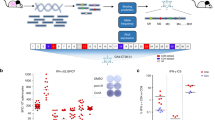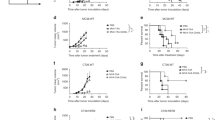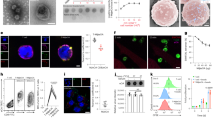Abstract
Background: As antitumoral immunity requires the generation of local immunity directed against tissue proteins, we attempted to recreate within tumors the same environment found within tissues affected by autoimmune diseases (i.e., prolonged cytokine expression). Vaccinia virus (VV) has not been widely used as a cytokine gene therapy vector because of presumed high immunogenicity that would likely make repeated injections impossible; therefore, we modified it by inserting the cytokine gene into the thymidine kinase region, rendering it replication-restricted. The cytokine chosen was human interleukin-2 (IL-2), a molecule with powerful antitumoral effects.
Methods: Six patients with the treatment-resistant tumor malignant mesothelioma received intratumoral (i.t.) VV-IL-2 therapy for 12 weeks by injection of 107 plaque-forming units of VV-IL-2 per dose. Serial tumor biopsies, sputum, urine, and blood samples were tested for VV-IL-2 mRNA expression; VV culture and T-cell infiltrates were evaluated by immunohistochemistry. Patients and contacts of patients were monitored for changes in VV immunoglobulin G (IgG) levels and clinical evidence of VV infection.
Results: VV-IL-2 was not excreted and was only cultured in one patient from tumor biopsies. A T-cell infiltrate was detected in 50% of tumor biopsies. VV-IL-2 mRNA expression was highest on days 1–3 postinjection and was detected for up to 3 weeks after each injection even though VV IgG levels rose in all patients. No significant toxicities, infection of patient contacts, or tumor regressions were observed.
Conclusions: I.t. VV-IL-2 administration is safe, is associated with minimal toxicity, and results in i.t. expression of VV-IL-2 for up to 3 weeks postinjection regardless of the level of anti-VV IgG titers generated. This suggests that VV may be a good vector for repeated cytokine gene therapy of solid human cancer.
This is a preview of subscription content, access via your institution
Access options
Subscribe to this journal
Receive 12 print issues and online access
$259.00 per year
only $21.58 per issue
Buy this article
- Purchase on Springer Link
- Instant access to full article PDF
Prices may be subject to local taxes which are calculated during checkout
Similar content being viewed by others
Author information
Authors and Affiliations
Corresponding author
Rights and permissions
About this article
Cite this article
Mukherjee, S., Haenel, T., Himbeck, R. et al. Replication-restricted vaccinia as a cytokine gene therapy vector in cancer: Persistent transgene expression despite antibody generation. Cancer Gene Ther 7, 663–670 (2000). https://doi.org/10.1038/sj.cgt.7700133
Received:
Accepted:
Published:
Issue Date:
DOI: https://doi.org/10.1038/sj.cgt.7700133
Keywords
This article is cited by
-
Evaluation of the oncolytic potential of R2B Mukteshwar vaccine strain of Newcastle disease virus (NDV) in a colon cancer cell line (SW-620)
Archives of Virology (2017)
-
Combined expression of miR-34a and Smac mediated by oncolytic vaccinia virus synergistically promote anti-tumor effects in Multiple Myeloma
Scientific Reports (2016)
-
Gene therapy for malignant mesothelioma: Current prospects and challenges
Cancer Gene Therapy (2013)
-
Clinical development directions in oncolytic viral therapy
Cancer Gene Therapy (2011)
-
Evaluating vaccinia virus cytokine co‐expression in TLR GKO mice
Immunology & Cell Biology (2011)



